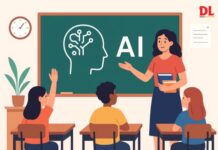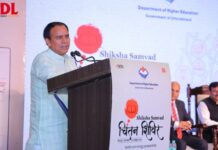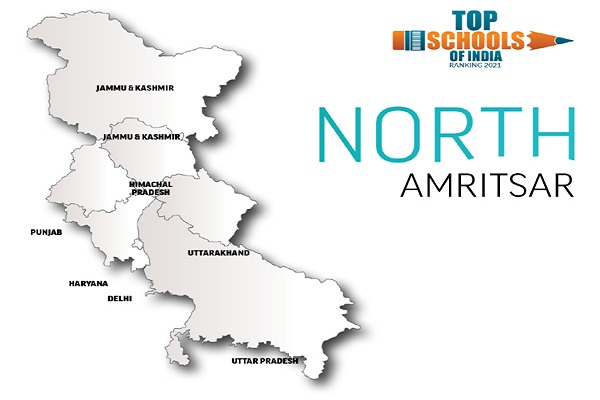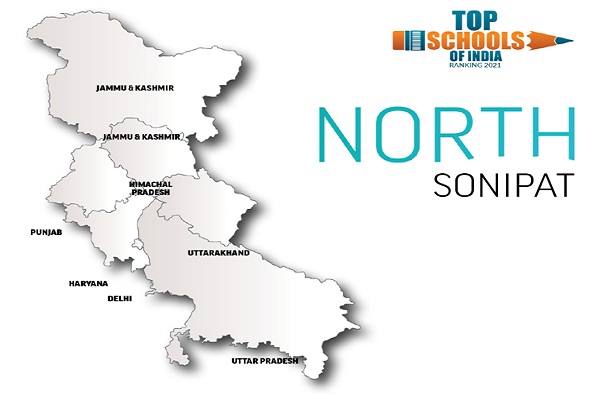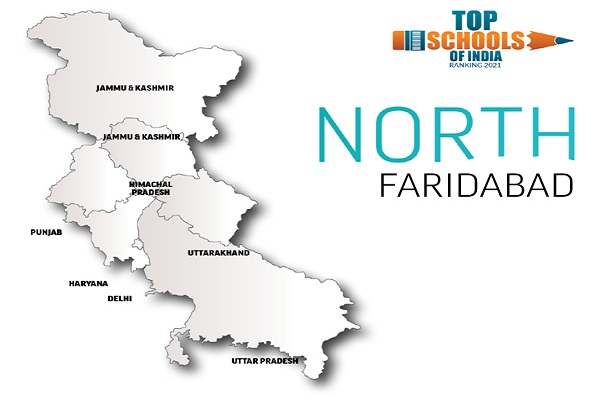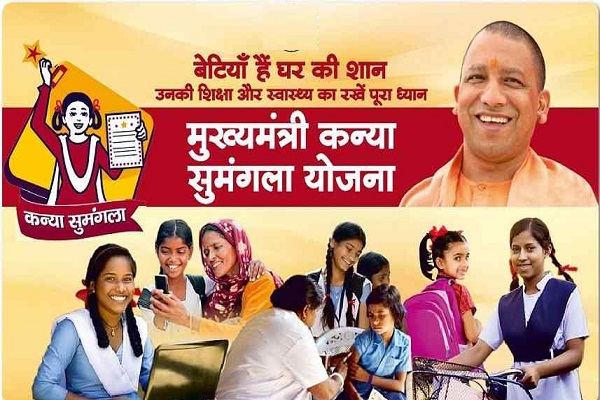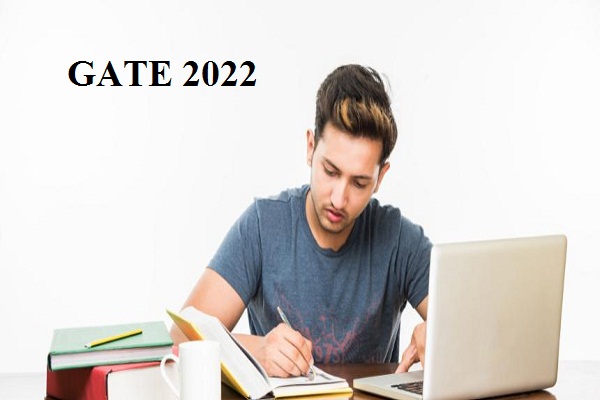| Name of School | Goodwill, Legacy & Reputation Rank | Academic Excellence Rank | Future Ready Infrastructure Rank | Enrichment of Learning Experience in Sports, Cultural Activities Rank |
Online & Social Presence Rank |
|
Holy Heart Presidency School |
1 |
1 |
2 |
2 |
1 |
|
Spring Dale Senior |
1 |
3 |
5 |
1 |
5 |
|
DAV Public School, |
2 |
4 |
1 |
3 |
5 |
|
DAV International School |
4 |
5 |
3 |
5 |
3 |
|
Delhi Public School |
3 |
2 |
4 |
4 |
8 |
|
Ryan International School |
7 |
7 |
6 |
7 |
4 |
|
BDS Public School |
6 |
8 |
8 |
11 |
2 |
|
The Millennium School |
6 |
3 |
6 |
5 |
9 |
|
Shri Ram Ashram |
8 |
9 |
11 |
8 |
1 |
|
Sacred Heart Senior |
10 |
10 |
13 |
9 |
7 |
|
Ajanta Public School |
12 |
12 |
7 |
13 |
6 |
|
St Francis School |
9 |
11 |
9 |
10 |
13 |
|
Bhavan’s SL Public |
11 |
13 |
14 |
12 |
10 |
|
The Junior Study |
14 |
16 |
10 |
15 |
11 |
|
Sri Guru Harkrishan |
16 |
17 |
12 |
17 |
7 |
|
Indus World School |
13 |
14 |
15 |
16 |
15 |
|
Alpine Public School |
15 |
15 |
17 |
14 |
14 |
|
Mount Litera Zee |
17 |
18 |
16 |
18 |
16 |
|
The Senior Study School |
19 |
20 |
19 |
20 |
20 |
|
Jagat Jyoti Model High |
18 |
19 |
18 |
19 |
17 |
|
Manav Public School |
20 |
21 |
20 |
21 |
18 |
Top schools of India ranking 2021: Amritsar
Top schools of India ranking 2021: Sonipat
| Name of School | Goodwill, Legacy & Reputation Rank | Academic Excellence Rank | Future Ready Infrastructure Rank | Enrichment of Learning Experience in Sports, Cultural Activities Rank |
Online & Social Presence Rank |
|
Delhi Public School |
2 |
1 |
2 |
1 |
1 |
|
Gateway International |
1 |
2 |
1 |
2 |
2 |
|
Motilal Nehru School of Sports |
3 |
3 |
4 |
3 |
6 |
|
G D Goenka International School |
3 |
4 |
3 |
3 |
8 |
|
Rishikul Vidyapeeth |
4 |
3 |
3 |
4 |
8 |
|
Apollo International School |
5 |
7 |
5 |
5 |
3 |
|
DAV Public School |
6 |
5 |
7 |
7 |
7 |
|
Little Angel School |
7 |
8 |
6 |
9 |
5 |
|
Stanford International School |
8 |
9 |
9 |
6 |
9 |
|
Shambhu Dayal Modern School |
9 |
6 |
8 |
8 |
17 |
|
TDI International School |
12 |
10 |
8 |
10 |
15 |
|
Golden Harrier School |
10 |
13 |
11 |
12 |
13 |
|
Hindu Vidyapeeth |
11 |
11 |
10 |
13 |
14 |
|
Holy Child School |
15 |
12 |
17 |
11 |
4 |
|
Shreejee International School |
14 |
16 |
13 |
16 |
10 |
|
Shiva Shiksha Sadan |
13 |
15 |
14 |
18 |
11 |
|
Holy Child Secondary School |
16 |
17 |
12 |
17 |
12 |
|
The Vedic Era Public School |
17 |
14 |
15 |
15 |
18 |
|
Janki Das Kapur Public |
18 |
20 |
16 |
13 |
14 |
|
Swarnaprastha Public |
20 |
19 |
18 |
20 |
6 |
|
South Point Schools |
19 |
18 |
19 |
19 |
13 |
Top schools of India ranking 2021: Faridabad
| Name of School | Goodwill, Legacy & Reputation Rank | Academic Excellence Rank | Future Ready Infrastructure Rank | Enrichment of Learning Experience in Sports, Cultural Activities Rank |
Online & Social Presence Rank |
|
Apeejay Svran Global School, Sec 21 D |
1 |
1 |
2 |
1 |
1 |
|
Apeejay School, Sec 15 |
1 |
1 |
3 |
2 |
3 |
|
Modern Delhi Public School |
2 |
3 |
6 |
3 |
2 |
|
Delhi Public School |
1 |
2 |
1 |
2 |
12 |
|
Ryan International School |
4 |
5 |
8 |
6 |
3 |
|
Manav Rachna |
6 |
5 |
9 |
6 |
3 |
|
The Shriram Millennium |
3 |
4 |
4 |
3 |
17 |
|
Modern Vidya Niketan, |
5 |
7 |
7 |
7 |
5 |
|
Eicher School |
5 |
6 |
5 |
4 |
15 |
|
Vidya Sanskar |
7 |
8 |
11 |
5 |
19 |
|
DAV Public School, Sector 14 |
10 |
9 |
10 |
8 |
17 |
|
DAV Public School, |
9 |
10 |
12 |
11 |
20 |
|
Manav Rachna International School, Sector 14 |
11 |
13 |
16 |
15 |
7 |
|
Modern Vidya Niketan, Aravali |
8 |
12 |
13 |
9 |
22 |
|
Aravali International |
15 |
14 |
14 |
14 |
11 |
|
DAV Public School, |
13 |
11 |
19 |
8 |
20 |
|
St Thomas Senior |
12 |
13 |
15 |
13 |
23 |
|
Ashok Memorial Public |
15 |
12 |
17 |
12 |
24 |
|
Manav Rachna International School, Sector 21C |
20 |
15 |
20 |
21 |
4 |
|
Grand Columbus |
16 |
19 |
18 |
10 |
21 |
|
Dynasty International |
18 |
24 |
23 |
17 |
14 |
|
Satyug Darshan |
21 |
16 |
21 |
21 |
8 |
|
Homerton Grammar |
14 |
18 |
24 |
18 |
16 |
|
Rawal International |
17 |
17 |
22 |
16 |
18 |
|
Vidya Mandir Public School |
19 |
20 |
25 |
19 |
9 |
|
Dudes And Dolls |
20 |
21 |
23 |
20 |
10 |
|
D C Model Senior Secondary School |
21 |
22 |
24 |
22 |
6 |
|
St John’s School |
22 |
23 |
26 |
23 |
13 |
Top schools of India ranking 2021: Panchkula
| Name of School | Goodwill, Legacy & Reputation Rank | Academic Excellence Rank | Future Ready Infrastructure Rank | Enrichment of Learning Experience in Sports, Cultural Activities Rank |
Online & Social Presence Rank |
|
Satluj Public School |
1 |
1 |
1 |
1 |
2 |
|
Bhavan Vidyalaya |
2 |
2 |
1 |
3 |
1 |
|
St.Soldier’s School |
4 |
7 |
2 |
4 |
1 |
|
Hansraj Public School |
3 |
4 |
4 |
3 |
11 |
|
The British School, sector 12 |
4 |
3 |
6 |
6 |
6 |
|
DC Model Senior Secondary School |
5 |
5 |
7 |
4 |
12 |
|
The Gurukul |
7 |
9 |
9 |
5 |
9 |
|
Manav Mangal School |
6 |
8 |
5 |
8 |
10 |
|
Little Flower Convent School |
8 |
6 |
8 |
7 |
9 |
|
Doon Public School |
8 |
10 |
10 |
10 |
2 |
|
Blue Bird High School |
9 |
12 |
10 |
9 |
4 |
|
Saupin’s School |
9 |
11 |
10 |
11 |
7 |
|
DAV Senior Secondary Public School |
10 |
14 |
11 |
12 |
8 |
Top schools of India ranking 2021: Gurgaon
| Name of School | Goodwill, Legacy & Reputation Rank | Academic Excellence Rank | Future Ready Infrastructure Rank | Enrichment of Learning Experience in Sports, Cultural Activities Rank |
Online & Social Presence Rank |
|
The Heritage School |
1 |
1 |
1 |
2 |
6 |
|
Lotus Valley International School |
3 |
2 |
2 |
1 |
3 |
|
G D Goenka Global School |
2 |
3 |
4 |
3 |
7 |
|
Ajanta Public School |
3 |
4 |
3 |
3 |
8 |
|
Indus World School |
4 |
6 |
5 |
5 |
9 |
|
Shikshantar School |
9 |
9 |
8 |
7 |
1 |
|
DAV Public School, Sector 14 |
5 |
7 |
6 |
7 |
10 |
|
Manav Rachna International School, Sector 57 |
6 |
5 |
8 |
6 |
10 |
|
Suncity School |
4 |
5 |
7 |
6 |
19 |
|
Bal Bharti Public School, IMT Manesar |
5 |
7 |
3 |
4 |
22 |
|
Amity International School, Sector 43 |
7 |
12 |
11 |
9 |
2 |
|
Salwan Public School |
7 |
8 |
9 |
5 |
17 |
|
Shalom Hills International |
8 |
10 |
10 |
11 |
13 |
|
Amity International School, Sector 46 |
12 |
11 |
17 |
8 |
11 |
|
The Maurya School |
15 |
12 |
15 |
12 |
5 |
|
Blue Bells Model School |
11 |
13 |
13 |
13 |
15 |
|
GD Goenka Public School |
15 |
20 |
16 |
10 |
4 |
|
Chiranjiv Bharati School |
14 |
14 |
12 |
14 |
12 |
|
Manav Rachna International School, Sector 46 |
10 |
13 |
14 |
15 |
16 |
|
Ryan International School, Sector 40 |
13 |
19 |
23 |
18 |
N/A |
|
Ryan International School, Sohna Road |
19 |
16 |
18 |
21 |
8 |
|
Blue Bells Public School |
16 |
18 |
20 |
16 |
18 |
|
Delhi Public School, Maruti Kunj |
17 |
15 |
22 |
17 |
20 |
|
The Millennium School |
20 |
17 |
19 |
21 |
14 |
|
Delhi Public School, Sector |
19 |
22 |
21 |
20 |
23 |
|
Summer Fields School |
22 |
21 |
25 |
19 |
21 |
|
Delhi Public School, Sushant Lok |
18 |
23 |
24 |
22 |
24 |
|
Mount Olympus School |
20 |
25 |
28 |
22 |
25 |
|
GEMS International School |
23 |
24 |
26 |
23 |
26 |
|
Presidium Senior |
21 |
25 |
27 |
24 |
27 |
MSBSHSE Maharashtra board Class 10, 12 board exam schedule released
The Maharashtra State Board of Secondary and Higher Secondary Education (MSBSHSE) has released dates for 2021-22 class 10, 12 and state board examinations. The written exams for Higher Secondary Certificate (HSC) will be conducted from March 4 to March 30, and the examinations for Secondary School Certificate (SSC) will be held between March 15 and April 24. The exams will be conducted following Covid-19 norms.
Also read: Maharashtra Govt. issues guidelines for reopening of primary schools
For class 12, the first exam is English while for class 10 the exams will begin with a first language paper. The exams will be conducted in two shifts – 10:30 am to 2 pm in the morning and 3 pm to 6:30 pm in the evening. Candidates can check the datasheet on the official website – mahahsscboard.in
Review 2021 – Virtual Communications and Collaboration
- Growing adoption of collaboration platforms across industries
There has been widespread adoption of collaboration platforms across industries to improve and personalise Customer Experience (CX). Organisations are using these platforms in innovative ways to improve, personalise and hence deliver better CX to a variety of customers across rural and urban areas. This has helped companies establish a better connect with a larger customer base and gives customers the flexibility to connect from anywhere, anytime and across any device/platform. Beyond connecting with customers, companies are also using collaboration platforms in a variety of ways such as to enable new ways of working, learning, service delivery, hosting events and empowering a hybrid workforce. While financial institutions are using our platform to serve a growing number of clients who prefer to connect digitally, and to give employees the flexibility to embrace hybrid work; health delivery organisations, health systems, and pharma-biotech companies are using them for everything from virtual visits to global collaboration. Educators have also embraced communications and collaboration to improve equity, inclusiveness, accessibility, engagement and offer an immersive experience to the classrooms and campuses of tomorrow. Organisations across industries are now bringing to the table a total experience through the blend of in-person and virtual connections.
- Hybrid and Flexibility – a new normal emerges
As we approach the end of 2021, organisations across the globe have understood the importance of the hybrid work space and are preparing their teams for this new normal. As a semblance of normalcy resumed during the latter half of the year, we saw organisations adopt a mix of remote, hybrid and physical setups in different mixes as were best suited to their objectives. Collaboration platform providers like Zoom stepped up by adding new products to serve the changing customer needs. Many studies have clearly shown that most employees want a hybrid and flexible approach where they are given the freedom to work both from home and from the office. Happy employees lead to happy customers and organisations have started addressing these demands of the workforce for a win-win situation. Employees have become the focus of every work strategy/ approach as they look for an environment where they can be most productive and feel most mentally balanced. In this time of rapid change, reflecting on our progress to identify areas for improvement and stay on the right track is critical for self-improvement.
- Virtual Care and Telehealth are here to stay
The past couple of years have really highlighted the importance of virtual healthcare. Telehealth and video communications have made value-based care more accessible, convenient, and affordable. Various innovations and improvements have improved patient experience to a great extent. Providers today can consult with global experts and continue their medical education with virtual training, certification programs, and conferences. Hospital administrators can convene staff meetings virtually across multiple departments and buildings for routine announcements and emergency communications. Consumers too want to be able to have flexible options — be it with primary caregivers or with overall wellness providers. For telehealth and virtual care solution providers, reliability, consistency, and quality are key to improving the patient experience. Using a video platform that connects everyone along the care continuum can lead to greater information sharing and collaboration for improved patient care and outcomes.
- The Zero Trust Approach
To adapt to hybrid working environments, more companies will drive to adopt the ‘Zero Trust’ security model. The ‘zero trust’ approach requires verifying everything and trusting none when it comes to cybersecurity. Conversations around protecting the hybrid workforce from risk will lead security professionals to adopt modern tools and technologies, like multi-factor authentication and the Zero Trust approach to security. We believe that companies need these tools to make sure their employees can get work done as safely as possible from wherever they are — commuting, traveling, or working from home — and that all of their endpoints are secured with continual checks in place. Security leaders also need to step up their protections against third-party risks. Our industry saw a distinct increase in supply chain attacks. CISOs need to make sure their vendors are also secure. Despite a sharp increase in cyber-attacks, the majority of firms are not well prepared and with security threats worsening, they need to consider setting up special committees for cybersecurity. Companies will increasingly consider hiring cybersecurity professionals to strengthen their cover, more so as the hybrid work culture sees greater adoption.
- A New Back to School Model Emerges
With academic institutions switching from remote to hybrid to in-person learning and back again over the past 18 months, faculty, administrators, and students had to re-examine their notions of what the new paradigm of education looks like. Educational institutes have adapted to the hybrid model of education which combines online and offline classes. As students emerge from the pandemic, educational institutes are focusing on improving student collaboration, teamwork, equity, inclusivity, accessibility, and engagement to meet the needs of the current and future students. Institutes have started gaining access to advanced tools that will enable them to transform education and the adoption of these will accelerate as these tools become more and more accessible. Just like remote workers, remote students now have more control over how they want to learn, where they want to learn and, in some cases, when they want to learn. Several schools around the world are also experimenting with newer models of class-scheduling like classes in alternate shifts during the day as well as conducting classes on alternate days. Today, the new back to school model is defined by the educational institution’s role in inculcating confidence and adaptability in learners irrespective of the format of learning.
By: Sameer Raje, General Manager & India Head, Zoom Video Communications, Inc.
Top schools of India ranking 2021: Chandigarh
| Name of School | Goodwill, Legacy & Reputation Rank | Academic Excellence Rank | Future Ready Infrastructure Rank | Enrichment of Learning Experience in Sports, Cultural Activities Rank |
Online & Social Presence Rank |
|
Carmel Convent School |
1 |
2 |
1 |
2 |
7 |
|
St Anne’s Convent School |
2 |
3 |
4 |
4 |
14 |
|
Strawberry Fields High School |
2 |
1 |
2 |
1 |
16 |
|
St John’s High School |
3 |
4 |
3 |
3 |
6 |
|
Delhi Public School |
4 |
6 |
5 |
5 |
4 |
|
Sacred Heart Senior |
5 |
4 |
7 |
7 |
15 |
|
Chitkara International |
6 |
7 |
3 |
4 |
5 |
|
Saupin’s School |
7 |
7 |
6 |
9 |
3 |
|
Bhavan’s Vidyalaya |
8 |
8 |
9 |
6 |
10 |
|
St Kabir Public School |
9 |
5 |
8 |
8 |
19 |
|
Ryan International School |
10 |
10 |
10 |
13 |
1 |
|
Vivek High school |
11 |
9 |
8 |
10 |
7 |
|
St Stephen’s School |
12 |
13 |
13 |
17 |
24 |
|
Saffron City School |
13 |
13 |
12 |
15 |
22 |
|
ST Johns High School |
14 |
11 |
15 |
11 |
10 |
|
Stepping Stones Senior Sec |
15 |
18 |
21 |
20 |
21 |
|
St Joseph’s Senior |
16 |
14 |
11 |
16 |
9 |
|
Pt. Mohan Lal SD Public |
17 |
12 |
16 |
14 |
2 |
|
Shivalik Public School |
18 |
19 |
14 |
12 |
8 |
|
St Mary’s School |
19 |
16 |
18 |
18 |
20 |
|
KB DAV Senior Secondary |
20 |
15 |
20 |
19 |
13 |
|
St Xavier’s Schools |
21 |
17 |
17 |
22 |
12 |
|
Banyan Tree School |
22 |
20 |
19 |
21 |
23 |
|
Mount Carmel School |
23 |
23 |
24 |
25 |
20 |
|
Dav Model School, Sector |
24 |
21 |
22 |
23 |
17 |
|
Dav School, Sector 8 |
25 |
22 |
23 |
24 |
11 |
|
Shishu Niketan Model |
25 |
24 |
25 |
26 |
18 |
Kanya Sumangala Yojna benefits 10.93 lakh girls in Uttar Pradesh
Ensuring complete welfare of the girl child, Chief Minister Yogi Adityanath’s Kanya Sumangala Yojana has benefited over 10.93 lakh girls in Uttar Pradesh till now through DBT. More than 1.01 lakh new eligible girls were added in the last six months under the scheme to whom PM Modi transferred Rs 20 crore on December 21.
The scheme is majorly benefitting the girl students studying in primary, upper primary, secondary and higher education.
Manoj Rai, Director, Women Welfare and Child Development department informed, “Since the implementation of Kanya Sumangala Yojana on April 1 2019, around 10.93 lakh beneficiaries have received the advantage under this scheme in the state so far.”
Also read: UP Govt. to upgrade facilities of Kasturba Gandhi Girls School
Aiming to establish an equal sex ratio, curbing female foeticide and child marriage in the state and linking daughters with education, the scheme envisages payment of Rs 15,000 to a girl over a period of about 15 years, starting from the time of her birth with the last installment paid when she gets admission to graduation or diploma course.
Financial support is provided in a phased manner under this scheme. A sum of Rs 2,000 and Rs 1,000 is given on birth and first vaccination respectively. This is followed by Rs 2,000 each at the time of admission in classes 1 and 6. The fifth installment of Rs 3,000 is given when a girl is enrolled in class 9 while the final installment of Rs 5,000 is disbursed when a girl who has passed intermediate takes admission to a graduation or diploma course
GATE 2022 admit cards to be released on January 3 2022
Important news for students appearing for the GATE 2022. Indian Institute of Technology (IIT) Kharagpur has released the schedule for the Graduate Aptitude Test in Engineering (GATE) 2022. The exams will be held from February 5 to 13, 2002. Candidates can check the complete schedule on the official website – https://gate.iitkgp.ac.in/
The exams will be conducted in two sessions. The forenoon session will be conducted from 9 am to 12 noon and the afternoon session will be held from 2:30 pm to 5:30 pm. As per the brochure, the exam will be held on February 5, 6, 12, and 13, 2022 in two sessions each day. It will be a fully computer-based test (CBT).
Also read: GATE 2022 Registration process Ends Today
The admit card for the exams will be released on January 3, 2022. Candidates will be able to download the admit card till the exam day. A hard copy of the hall ticket will have to be carried to the exam centre.
Two new papers called “Geomatics Engineering (GE)” and “Naval Architecture and Marine Engineering (NM)” are being introduced in GATE 2022. For candidates appearing for Geology and Geophysics (GG) papers, separate scores and ranking will be provided based on their selection of sections.
Direct recruitment to Group A level posts in central government, i.e, senior field officer (Tele), senior research officer (Crypto) and senior research officer (S&T) in cabinet secretariat, government of India, is now being carried out on the basis of GATE score.

